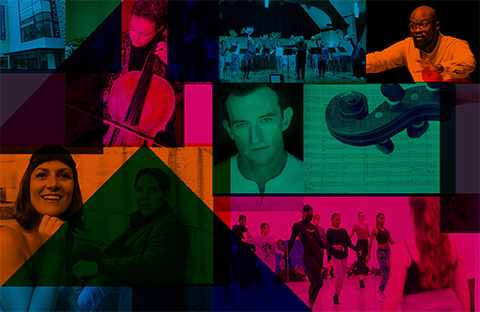For This Theater Maker, It Takes an Ensemble

Alum Shanelle Chloe Villegas (B.F.A. '19, contemporary theater) has spent most of her life in Boston, where she has become prominent in the city’s vibrant theater scene and drawn critical acclaim with spate of notable roles in productions such as BLKS, People, Places & Things, and School Girls; or, The African Mean Girls Play. In September 2022 she was featured in WBUR’s “The Makers: 15 artists of color leaving an imprint on Massachusetts.” Here, Villegas reflects on Boston Conservatory’s faculty and how the ensemble focus of the school’s contemporary theater program shaped her as a theater maker.
Who are some of the key teachers and mentors that you worked with at Boston conservatory? What were some of the most important lessons you learned from them?
It is hard to name just a few key teachers at Boston Conservatory because the entire theater faculty is out of this world. So many of my teachers had an instrumental role in shaping me into who I am as an artist and activist today.
From Chris Webb, a teacher I had for almost my entire college career, I learned about who I am as an individual and how to bring that into an ensemble. From Jennie Israel and Marya Lowry, I learned about and fell in love with the depth of Shakespeare’s text. They introduced me to language that can hold every part of me, that can allow me to be fluid in vocal range, gender, and physicality. They taught me about my power as a performer and how to speak my truth.
Mark Krawczyk, Susan Thompson, Alli Ross, David Gammons, and Mauricio T. Salgado taught me about experimental theater. In their classes we were able to create outside the box, often playing with avant-garde texts, movement styles, visual art, a mix of solo, partner, group work, or applied theater. In these classes, I learned how to not only be an actor but a theater maker with a voice and a vision that can be applied to more than just the stage. From Summer Williams, Theresa Lang, and David Valdes, I learned about how to be an ethically well- rounded, thoughtful, and inclusive creative person—how to know your beliefs and stand firmly in them as an artist, to amplify and protect those that you care about being seen and heard.
In your experience, how did their work as active performers and artists play into their teaching?
All of my teachers at Boston Conservatory were multi-hyphenate artists working multiple jobs and juggling many artistic projects while having families. To observe them going through this societal dance that artists are made to go through—successfully—gave me many examples of how I could live as an artist upon graduation. The fact that they all “walk the walk” allowed me to trust them when they “talked the talk.” In other words, nothing was theoretical with them because they all had lived experience in the theater industry. And although many of my teachers at Boston Conservatory have differing identities from mine (which inevitably shapes individual struggles or challenges in the theater industry), I was still able to relate to their stories about artistic failures and challenges and use them as a guide for what was to come for me.
You were part of the conservatory’s first graduating class of the contemporary theater program. How did this program and its faculty help prepare you for your career?
For us in this program, where we had to work with the same group members for four years in almost every class, our goals were twofold: we were focused not only on graduation and self-development but also on attempting to be an ensemble—a group of people working toward a common goal—on a daily basis.
So, at a very young age, all these young adults from wildly differing hometowns, social classes, ethnicities, and histories had their personal success intertwined with the success of the group. We constantly asked these big questions: How do we make decisions as a group? How is every voice heard and valued throughout the process? Who are we to each other, what are our roles within the group, and how and when do those roles shift? How can all these different people reach a common goal?
By asking these questions over and over again, some of our attempts at being an ensemble were successful. Some others, not so much. The times when we were successful were times when we had a vision open enough for all of us to fit inside of it, when grace replaced ego, when we all had authorship but could be fluid in our roles, and when we viewed each other as integral, not replaceable, to the vision and story.
"I learned how to not only be an actor but a theater maker with a voice and a vision that can be applied to more than just the stage."
From this experience, as an actor, educator, writer, and overall extrovert who is always in rooms with a wide array of individuals, I strive daily to reach this feeling with any group I ever work with. This program definitely gave me the foundational tools to show me how to work with a group in a democratic, non-hierarchical way and to value the voice of each person in the room. I think art is more beautiful, more memorable, when every artist has ownership—and in my career I aim to always connect with the ensemble before anything else happens.
You have had a rich and dynamic career as a theater artist. What are some of your proudest professional moments or projects you’ve been particularly excited about?
The projects I’ve been most proud and excited about were projects where I was really connected to the cast and we all just felt like a family. These shows include School Girls; or, The African Mean Girls Play and BLKS at SpeakEasy Stage Company as well as Classic Repertory Company, a Northeast tour of classical plays at New Repertory Theatre, and, most recently, a film project titled Being Human with Jagun Fly Productions. In all of these experiences, the ensemble and I took time throughout the process to do ensemble building, which allowed us to communicate more openly, problem solve, and ultimately trust and listen to each other on stage or on camera. I am super into astrology, and recently I had a reading of my astrological chart and the astrologer told me, “For any job you have and enjoy, your coworkers have to be your friends.” Basically, in all the productions named above, that’s how I felt.
Listen to Villegas discuss her work on WBUR.
READ: STAGES 2022–2023

“For This Theater Maker, It Takes an Ensemble” first appeared in the 2022–2023 issue of STAGES, Boston Conservatory's annual magazine.
